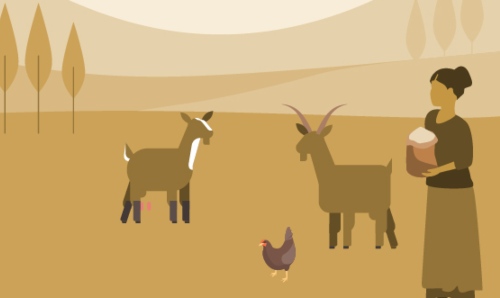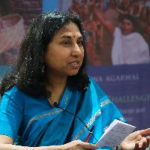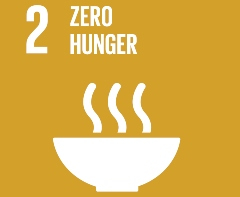
Creating sustainable livelihoods through group farming
South Asia’s agriculture is in crisis. The majority of its farmers are facing serious production constraints, making them economically non-viable. Research at The University of Manchester has shown that group farming initiatives could provide a sustainable solution to these problems.
This work delivers on the UN Sustainable Development Goal 2: end hunger, achieve food security and improved nutrition and promote sustainable agriculture.
Key facts
- The research led to the introduction of group farming in east and west India and Nepal
- It demonstrated that group farming enhances farm productivity and profits
- It also empowers women farmers, both socially and politically
More than 80% of South Asia’s farmers are cultivating under two hectares, usually in scattered plots. Most lack access to irrigation, credit, technical information, and the means to tackle climate change. A growing proportion of farms are managed by women, but without owning the land they cultivate, as men move to non-farm jobs.
For more than a decade, Bina Agarwal, Professor of Development Economics and Environment at the Global Development Institute, has examined whether cultivating in groups by voluntarily pooling land, labour, funds and skills and sharing costs and benefits, would enable small farmers to create larger, more profitable enterprises in South Asia, and beyond.
Pooling resources to create viable livelihoods
Professor Agarwal’s research in Kerala in south India showed that carefully structured group farming significantly enhanced farm productivity and profits, and created sustainable, food-secure livelihoods for vast numbers of poor women farmers.
Professor Agarwal also presented her findings to Kerala’s state government which had launched group farming in the early 2000s as part of Kudumbshree, the State’s Poverty Eradication Mission. Her research highlighted the economic success of group farms but also pointed to the need for greater inclusion of caste-disadvantaged women and increasing women’s land access. The government acted on her recommendations. Today, Kudumbashree involves 4.4 million women in group enterprises in 14 districts. This includes 68,000 group farms managed by more than 330,000 women farmers. Many of these farmers have won positions in village council elections.
Empowering women farmers
We found that with group farming the women could produce more and save on costs. Most importantly, they reported being food secure during COVID-19 lockdown, which would not have been possible if they had farmed individually. Professor Agarwal’s research and workshop have set in motion a process for providing livelihood protection and transforming the lives of large numbers of disadvantaged women.
Ms Hiral Dave / Programme Manager, Cohesion Foundation Trust, Ahmedabad, Gujarat
Professor Agarwal’s work on Kerala provided the basis for a new action-research project on group farming launched in 2015 in east India and Nepal by the International Water Management Institute, with local NGO support.
Her follow-up analysis based on this project showed that forming farmer collectives brought substantial benefits. It enabled effective irrigation; empowered farmers to bargain down high rents charged by feudal landlords; provided access to government schemes; raised food crop yields; and developed women’s technical skills.
Professor Agarwal also conducted workshops elsewhere in India. This led directly to a local NGO, Cohesion, in Gujarat state to promote new group farms, benefiting poor tribal women.
Surviving the pandemic
The effectiveness of the group farming model was further demonstrated during India’s COVID-19 lockdown in 2020. In Kerala, 87% of the 31,000 women’s group farms cultivating then were able to harvest and sell their produce, whereas large numbers of individual farmers lost their investment. Farmer collectives in east and west India, formed by drawing inspiration from Professor Agarwal’s work, also reported being more food secure under COVID-19 than individual farmers.
Podcast: Creating sustainable livelihoods through group farming

Listen to The University of Manchester’s Dr Nic Gowland interview some of our leading experts about how their research is helping to deliver the UN Sustainable Development Goals for global health, equality and sustainability.
Download the Creating sustainable livelihoods through group farming podcast transcript (PDF, 484KB).
Can group farming provide an answer?
As part of the Global Development Institute Lecture Series, Professor Bina Agarwal talks about the agrarian crisis and institutional innovation.
Connected activity
- Can group farms outperform individual family farms? Empirical insights from India (research paper)
- Experiments in farmer collectives in east India and Nepal (research paper)
- To put Kerala back on its feet (news story)
- Agriculture and rural sector can jump-start economy if we fix its ills (news story)
Doing things differently: Women and Work
Stream our Doing things differently: Women and Work video.
Stream now
India's COVID-19 Challenge: Outcomes and Options
Professor Agarwal discusses India's COVID-19 challenge as part of the George Washington University's Envisioning India series.
Stream on YouTube now


